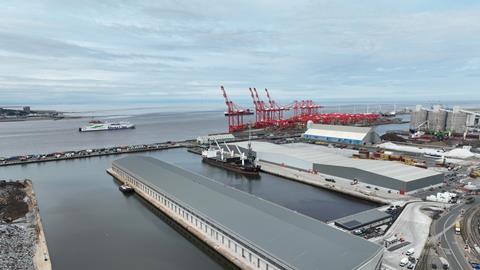Construction firm Glencar has completed construction of a new 240,000sq ft multi-user warehouse for Peel Ports at their Alexandra Dock development at the Port of Liverpool, the company announced today (5 August).
The development, which took 12 months to build was designed by leading architects Chetwoods and at 400 metres, its length is equivalent to five full-size football pitches.
The facility is designed to handle and store a variety of commodities including both unitised and non-unitised.
Works included the installation of 6,500 piles, 729 PCC push wall panels weighing over 4,800 tonnes together with over 40,000m³ of concrete poured.
The building, referred to as the Alexandra Dock Multi-User Warehouse (MUW) also features 300 metres of dedicated quayside, state-of-the-art cranes for vessel discharge, fast HGV turnaround times, vehicle wash bay, separate office block and welfare facilities and weighbridges and marshalling cabin.
Pete Goodman, Glencar MD for the Midlands and North, said: “Ports serve as a critical part of the UK supply chain and multi-user facilities of this type contribute towards the continuation of the import and export of vital goods and enhance the port’s warehousing and distribution capabilities.
”This development aims to optimise supply chains, reduce road miles, and provide substantial cost, carbon, and congestion benefits, solidifying Liverpool’s role in the UK’s logistics network.
”This serves as the second project we have completed to date for Peel Ports with further announcements set to be made in the not-too-distant future as Glencar continues to expand its port-side and critical transport infrastructure and civils offering.”
Phil Hall, Peel Ports Group Mersey port director, added: “We’re very pleased to see the successful completion and full occupancy of Alexandra Dock warehouse at the Port of Liverpool.
”This facility enhances our logistics capabilities and demonstrates our commitment to developing sustainable, port-centric solutions for our customers.
”The strong uptake reflects the demand for high-quality warehousing space in this strategic location, and provides real cost, carbon and congestion benefits to supply chains, reinforcing Liverpool’s position as a key logistics hub.”

















